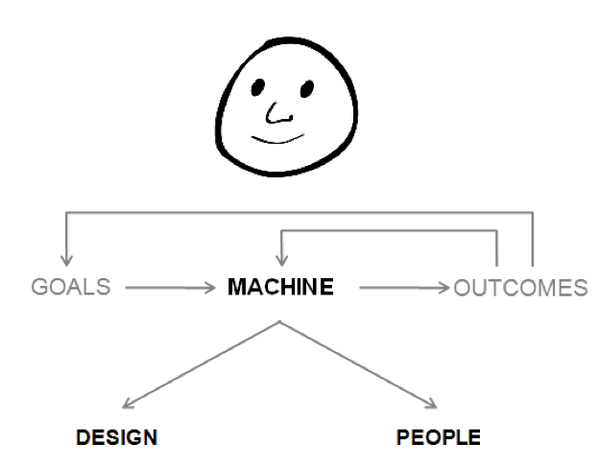「Higher level thinking」
-- 出自 Ray Dalio 的《Principles》(PDF 原文:Principles by Ray Dalio)
Higher level thinking(高级别、高层次思维),实际上是一种理解起来非常简单且易于实行的方法论,即跳出以事实组成的现实世界(可以理解为现实生活),站在更高一层,系统地思考「低层」的现实世界,以实现个人目标为最终目的,设计出由「正确的人」和「正确的事情」所组成的「系统」(原文为「machine」,Ray 本人喜欢用理解机器的思维方式来解构现实世界及各种现象背后的原因),该系统应存在于「结果」—「目标」—「系统」三者组成的反馈链之中。最重要的是,你本人也包含于这个系统中,且应当被看做一个客观的元素(指摒弃掉所有个人主观情绪来看待自我,将自我融入系统之中)。
具体如下图:

其中「Machine」即为这个系统(机器),「Design」指实现目标的方法、途径(「正确的事情」),People 即为「正确的人」;Goals 是事先确定的目标(关于寻找目标,Ray 在之前的章节亦有阐述),Outcome 即为系统输出结果。关于「目标」—「系统」—「结果」的反馈机制应该不难理解(通过分析结果本身及其和目标之间的差距来修正系统)。
=====================================================
"I call it “higher level thinking” because your perspective is of one who is looking down on at your machine and yourself objectively"
-- 我管这种思维方式叫做「高层次思维」;在这种思维框架中,你以更高层次的(上帝)视角,客观地看待你的「系统」(机器)以及你自己。
“In other words, your most important role is to step back and design, operate and improve your “machine” to get what you want.”
-- 换句话说,你最重要的职责是退后一步,站在更高层次来设计、运作并改进你的“系统”(机器),来帮助你获得你想要的。
=====================================================
那么到底什么叫「客观地看待你自己」呢?
假设你是篮球队经理,你的目标是赢得比赛:
Think of it as though there are two yous—you as the designer and overseer of the plan to achieve your goals (let’s call that one you(1)) and you as one of the participants in pursuing that mission (which we will call you(2)). You(2) are a resource that you(1) have to get what you(1) want, but by no means your only resource. To be successful you(1) have to be objective about you(2).
-- 首先想象一下有两个你——为了实现你的目标而设计并监督整个系统的你(称为「你(1)」)以及作为系统参与者执行任务的你(称为「你(2)」)。「你(2)」是「你(1)」为了实现「你(1)」的目标而动用的人力资源,但绝不是你唯一的资源。为了实现「你(1)」的目标,「你(1)」必须客观地看待「你(2)」。(不妨理解为「你(1)」是工头儿,「你(2)」是搬砖的)
If you(1) see that you(2) are not capable of doing something, it is only sensible for you(1) to have someone else do it. In other words, you(1) should look down on you(2) and all the other resources at your(1) disposal and create a “machine” to achieve your(1) goals, remembering that you(1) don’t necessarily need to do anything other than to design and manage the machine to get what you(1) want. If you(1) find that you(2) can’t do something well fire yourself(2) and get a good replacement! You shouldn’t be upset that you found out that you(2) are bad at that—you(1) should be happy because you(1) have improved your(1) chances of getting what you(1) want. If you(1) are disappointed because you(2) can’t be the best person to do everything, you(1) are terribly naïve because nobody can do everything well.
-- 如果「你(1)」发现「你(2)」在做某些事情上无能为力,那么「你(1)」应当另择人选。换句话说,「你(1)」应该如同看待系统中所有其他的资源一样来(客观)看待「你(2)」。记住,「你(1)」除了设计和管理整个系统之外,不需要做任何事情。如果「你(1)」发现「你(2)」有些事儿做的不好,直接炒了「你(2)」,找其他人来做。对于发现「你(2)」不行这件事儿,你不应当感到沮丧——「你(1)」反而应该感到高兴,因为「你(1)」提高了「你(1)」得到「你(1)」想要的东西的可能性(即设计了更好的系统)。如果「你(1)」对于「你(2)」不是做所有事情的最佳人选感到失望,那么你简直图样!因为没人能把所有事儿都做好。
=====================================================
这个系统或者说思维方式算不上牛逼,更算不上有创意,但是易于理解、简单易行并久经考验,不存在多种思维方式或操作法则并行。
如果大家对于此人的思维方式和处事原则感兴趣,不妨阅读 PDF 全文,其中详细阐述了 Ray 本人认为最重要的生活准则及管理准则,对于如本人这般不成思维不成体系、理解力有限且知识面狭窄(但又对理解世界拥有十足好奇心)的同学来说不失为一本入门宝典。